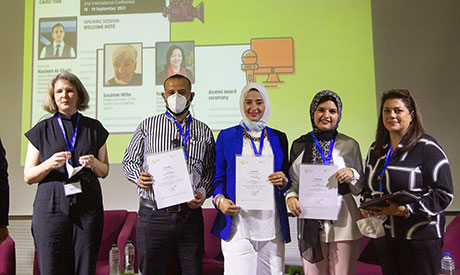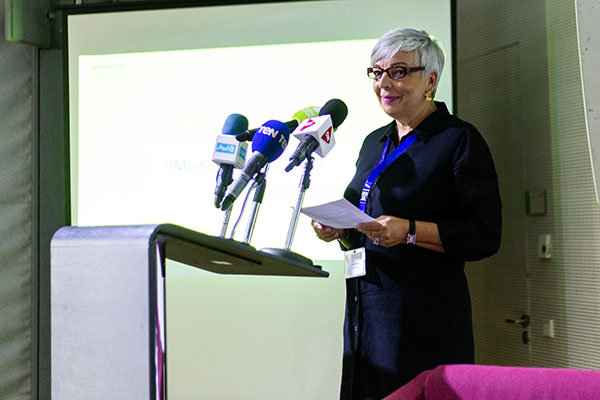
winners of the science journalism competition and Director of the Cultural Programmes Department at the Cairo Goethe Institute and Regional Officer Anne Eberhard pose for an image.
The second international conference of the Media and Science Project, entitled ‘Science Meets Journalism – Media and Science in Turbulent Times,’ was held on 18 and 19 September at the premises of the Goethe Institute in Dokki, Giza.
This year's conference discussed a range of important topics, such as the coverage of science in times of crisis, how the COVID-19 pandemic has affected the press and media with regard to fake news and news verification, water scarcity in the region, and how TV dramas and films deal with scientific topics.
The regional director of the Goethe Institute in the Middle East and North Africa Susanne Höhn expressed her happiness with the successful organising of the international conference despite the many difficulties related to travel restrictions.

The regional director of the Goethe Institute in the Middle East and North Africa Susanne Höhn.
Höhn also stressed that Science Journalism builds bridges of communication between the media and scientific community to discuss important topics from which the public can benefit. Furthermore, she said, there is no doubt that the coronavirus pandemic represented a major shift in the interest in scientific journalism.
"We are pleased to organise this year's conference, with the participation of media experts and academics as well as the pioneers of initiatives. For four years, we have been supporting scientific journalism by offering workshops and training programmes, until we could create a network of more than 100 journalists in the whole region. Now, they are qualified to write about, and research, scientific topics. However, there is no doubt that the coronavirus pandemic has given this topic a new dimension, so that science journalism has finally received the attention it has long deserved," Höhn said.
At the conclusion of the inaugural session, Director of the Cultural Programmes Department at the Cairo Goethe Institute and Regional Officer Anne Eberhard handed out the prizes to the winners of the science journalism competition organised by the Institute. One hundred journalists had applied in the competition from different countries in the region. The winners are Engy El-Toukhi and Samar Ashraf from Egypt, Bassam El-Qadi from Yemen, and Osman Abdel-Halim from Sudan.
The opening speech was given by Hashem El-Ghaili, science communicator and film director. His Facebook page, which aims to simplify and explain the sciences, is followed by more than 33 million people around the world, and has garnered more than 17 billion views. He won many awards in the field of science video production. El-Ghaili, a Yemeni national, obtained a master's degree in molecular biotechnology from Jacobs University in Germany, where he currently resides.
Since 2017, the project Media and Science, previously named Scientific Storytelling, aims at exploring the relationship between scientific research and journalism, in order to help ensure that scientific achievements are understood by broader audiences as well as to encourage civic engagement. Therefore, the Goethe Institute is organising regional trainings and workshops for both print and media journalists and science communicators alike.
Additionally, the institute published on its website an online training manual on science journalism for those who want to write about scientific topics.
The project is implemented in cooperation with the German Academic Exchange Service (DAAD) and is funded by the German Federal Foreign Office.
Short link: